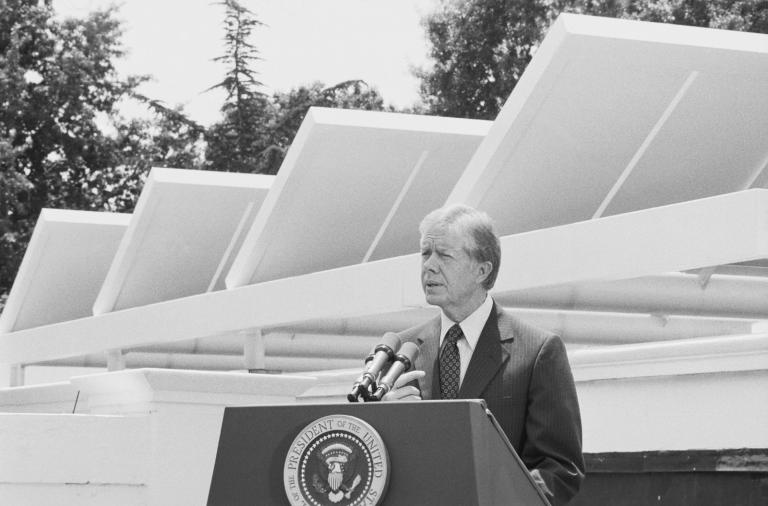First things first: A week of anticlimaxes saw President Barack Obama conducting a less-than-exuberant swing through China, the international community conceding a binding climate treaty at the COP-15 negotiations in Copenhagen, and U.S. lawmakers postponing to the spring of 2010 consideration of climate policy — even as talk of a legislative “plan B” surfaced. A Wall Street Journal piece on Obama’s China visit characterizes how hemmed in the president is abroad and at home, balancing as complex a portfolio as any new president has faced in a century, at least.
Obama left China with seven commitments to work more closely on energy matters, particularly the development of an inventory for China’s greenhouse gas emissions. This technical cooperation may have a political echo in Washington, where Senate Democrats making up their minds about climate change policy have expressed concern that the world’s leading CO2 producer, China, is unable to quantify its pollution. A close read of language in the U.S.-China agreement reveals “subtle but important shift” in climate positions, writes NRDC’s Jake Schmidt.
The call is (also) coming from inside the house: Other international voices sound increasingly nonplussed with U.S. performance in the global climate arena. Critics blame Obama, who personifies America abroad, for what they see as a continuation of President George W. Bush’s policies against Kyoto-style international climate agreements. The German newsweekly Spiegel publishes a deeply critical view of Obama’s young presidency. It echoes voices heard elsewhere, voices Climate Post heard a little bit in India last month and that he documented in a post this week over at the New York Times‘ DotEarth blog. The Catch-22: The U.S.’s critics abroad feel that their complaints will not be heard here, since, as Christian Schwägerl charges in Spiegel, “Americans do not look beyond their own borders.”
Naomi Klein, the activist, globalization skeptic, and writer, provides a fine example in Rolling Stone of how some Americans do not look within their own borders. Klein’s breathless call for climate reparations paid by rich nations to poor, vulnerable nations overlooks major and minor “real-world” issues, beginning with which bank account — previously unrevealed — is she writing her checks from? The piece makes a fine bookend with George Will’s latest effort, as naive as Will’s piece is ignorant. (Both writers seem equally angry.)
Thomas Friedman thumps opponents of measures to reduce national emissions of heat-trapping gases, condensing observations of his recent book into his New York Times column.
You heard it here first!: The COP-15 talks in Copenhagen were a cautious success. After months of increasingly dour headlines, 15,000 people (18 of them from the Nicholas Institute and Nicholas School) will have descended three weeks from now on this elegant Scandinavian capital and will have reached a political agreement, in a spirit of collaboration and goodwill that will be expected to lead to a binding legal treaty next year. Whatever will have happened in Copenhagen to make it a success — after all, we just don’t know — it’s likely that high-profile attendees will trumpet its successes, however defined. There has been too much anticipation, too much pre-game show, too many resources spent, to not produce something tangible, or at least argue that something tangible was produced. Even if it receives headlines similar in tone to Obama’s China trip.
A casual observer to the now year-long run-up to next month’s talks in Copenhagen might be forgiven for thinking that a treaty is an end in itself. The treaty is a means by which countries force themselves and each other to transform their economies toward non-polluting energy systems. The Guardian lassoes some top thinkers on climate policy, who emphasize the urgency to inject capital into energy technologies that do not emit heat-trapping gases. The public emphasis on a deal next month has overshadowed this urgency, the Guardian contents, and, unless investment picks up, nations will continue to build out fossil-fuel powered 20th-century-style infrastructure projects.
Without national or international guidance, businesses already working toward a clean tech economy face considerable uncertainty. Players in the $126 billion global carbon market — concentrated in the European Union’s emissions trading scheme — are particularly exposed. The impetus for that market came after the Kyoto Protocol. Its 2012 expiration date threatens investments, money, and projects tied up in the system. Developing nations, particularly China and India, have made up to hundreds of millions of dollars executing carbon-reduction projects that generate emission credits that rich nations use to “offset” their pollution. The global market for carbon offsets traded under the current regime adds up to $6.5 billion.
The push for “green jobs” continues, even without an international mandate. Americans in green jobs needn’t work for U.S. companies, it turns out. With Obama in China, Suntech, the world’s largest maker of solar panels, announced it would build a factory near Phoenix. The Chinese company’s move may ease some lawmakers’ concerns that less expensive labor costs will push clean-energy manufacturing jobs overseas, BusinessWeek reports. That the profit motive is drawing a Chinese solar giant to the U.S. should fuel the ongoing confusion about whether solar energy is affordable or not.
Roger Pielke Jr, the University of Colorado Boulder political scientist who plays Ugolino to more liberal climate bloggers’ Ruggieri (or vice versa), reminds us with a picture, and his own quick romp through the headlines, what’s happening, and keeps happening, far beneath lofty discussions and aspirations of Copenhagen.
A day in the life: Washington’s mystique might emerge in the contrast between the monumental things that occur here (and that are expected to but don’t), and the patient, gradual, and frequently silent steps it takes to achieve them. It takes a piece like Barry Yeoman’s profile of Tim Profeta, director of the Nicholas Institute for Environmental Policy Solutions (and Climate Post’s “publisher”) to add depth to the generally superficial headlines about events in Washington. The piece, just published in Duke magazine, lays out with dimension and color the Institute’s mission and the way we do the things we do.
Climate Post will be off next week for Thanksgiving and will return Dec. 3.
The Climate Post offers a rundown of the week in climate and energy news. It is produced each Thursday by Duke University’s Nicholas Institute for Environmental Policy Solutions.


